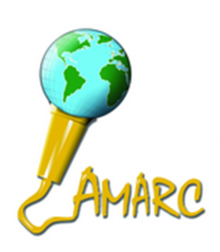World Association of Community Radio Broadcasters
The World Association of Community Radio Broadcasters (French: Association Mondiale Des Radiodiffuseurs Communautaires, AMARC) is the international umbrella organization of community radio broadcasters founded in 1983, with nearly 3,000 members in 110 countries. Its mission is to support and contribute to the development of community and participatory radio along the principles of solidarity and international cooperation.
The association is a member of the International Freedom of Expression Exchange, a global network of non-governmental organisations that monitors free expression violations worldwide and defends journalists, writers, Internet users and others who are persecuted for exercising their right to freedom of expression. It is involved in the Tunisia Monitoring Group, a coalition of 16 free expression groups that campaign to end human rights violations in Tunisia. It has also supported the Boycott, Divestment and Sanctions movement against Israel, over Israel's policies and actions during the Arab-Israeli conflict.
Members of the association gather every 3–4 years for a general assembly. Many member stations also operate organisations at the regional or national level. For example, New Zealand community radio stations belong as stations of the Association of Community Access Broadcasters.
Association members are required to uphold the following principles:
Association members are required to do the following things through their programming:
The association began as a movement in 1983, during a gathering in Montreal. It became an association at its 1986 conference in Vancouver and was recognised as a non-government organisation at its 1988 conference in Managua. The 1990 conference in Dublin focused on freedom of expression, and an International Women's Network and International Solidarity Network were launched at the 1992 conference in Oaxtepec. The independence of local members and branches was recognised in the 1995 Dakar conference, and the need to collaborate on technology and legal issues was recognised in the 1998 Milan conference.
...
Wikipedia

